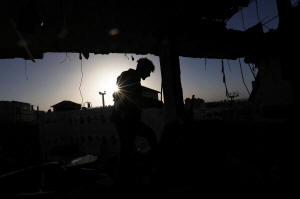Despair in Gaza as fighting intensifies despite promise to scale down
war
 Send a link to a friend
Send a link to a friend
 [January 10, 2024]
By Mohammed Salem, Simon Lewis and Nidal al-Mughrabi [January 10, 2024]
By Mohammed Salem, Simon Lewis and Nidal al-Mughrabi
GAZA/RAMALLAH/DOHA (Reuters) - Israeli strikes in southern and central
Gaza intensified on Wednesday despite a pledge by Israel that it would
pull out some troops and shift to a more targeted campaign, and pleading
from its ally Washington to kill fewer civilians.
Israel has said this week it is planning to begin drawing down troops,
at least from the northern part of Gaza, after weeks of U.S. pressure to
scale down its operations and shift to what Washington says should be a
more targeted campaign.
But the fighting appears to be as intense as ever, especially in the
southern and central areas where Israeli forces launched ground advances
last month.
In Rafah, on the southern edge of the enclave, relatives wept by the
bodies of 15 members of the Nofal family laid out at a hospital morgue
on Wednesday morning after their home was obliterated by an Israeli air
strike overnight.
Most of the white shrouds were tiny, with children inside. A man partly
opened one and caressed the face of a small boy with his hand. Relatives
gently restrained another man who was wailing at the feet of the bodies.
At the site of the strike, where a huge crater had been blasted in the
floor of a building, neighbors clambered through the ruins, strewn with
bloodsoaked mattresses and broken toys.

Um Ayman al-Najjar, whose daughter and niece were killed, was bundled
against the cold in the wreckage: "We woke up surrounded by all this
rubble on top of our heads, hit after hit. I don't know how we got out,
stepping above things, blood shedding from us."
Israel has killed more than 23,000 Palestinians in Gaza since launching
its campaign to eradicate the Hamas militant group that runs the
enclave, after Hamas fighters killed 1,200 Israelis and captured 240
hostages in a rampage on Oct. 7.
U.S. Secretary of State Antony Blinken, on his fourth trip to the region
since the war began, went to Ramallah on Wednesday and met Palestinian
leaders, including Palestinian Authority (PA) President Mahmoud Abbas,
in the Israeli-occupied West Bank. The PA, which exercises limited self
rule in the West Bank and accepts Israel's right to exist, lost control
of Gaza in 2007 to Hamas, which is sworn to Israel's destruction.
Blinken has also met Israeli leaders and visited nearby Arab states, in
search of a future settlement for the Gaza Strip, which has been laid to
waste by Israeli bombardment creating a humanitarian crisis for its 2.3
million residents.
Washington wants Israel to give the Ramallah-based PA a future role in
governing Gaza; Israel, which says it wants control of Gaza's security
indefinitely, is reluctant. Blinken said on Tuesday Israel had to make
"hard choices" and must keep alive hopes of an independent Palestinian
state if it wants to normalize relations with Arab neighbors.

[to top of second column]
|

A Palestinian man walks at the site of an Israeli strike, amid the
ongoing conflict between Israel and the Palestinian Islamist group
Hamas, in Rafah in the southern Gaza Strip January 10, 2024.
REUTERS/Ibraheem Abu Mustafa

"Israel must be a partner to Palestinian leaders who are willing to
lead their people living side by side in peace with Israel and as
neighbors," he said in Tel Aviv on Tuesday.
WORDS WRITTEN IN BUTTER
Despite a public assertion by Israel since the New Year that it is
scaling back the war, Gaza residents say they have seen no let-up.
The northern half of the enclave is still off-limits, and the
southern half has become a full-blown war zone in recent weeks.
Nearly the entire population has been driven from their homes at
least once, many displaced several times as Israeli forces advance.
Um Ahmed, a mother of five from Gaza city now sheltering in a tent
in Rafah, said Gazans had hoped Blinken's visit meant they would be
allowed to return to their homes.
“It is like words written in butter, it soon disappeared with the
rise of the sun. That was the words of Blinken, fake,” she said.
Residents of Bureij, Nusseirat, and Maghazi in the central Gaza
Strip reported intensive bombardment overnight, with Israeli tanks
that launched an offensive there around Christmas pushing deeper
into Bureij and Maghazi.
In Nusseirat, a new wave of displacement was under way, a day after
Israel dropped new warning leaflets for residents of several
districts to evacuate their homes and head west to Deir al-Balah.
Israeli bombing was also taking place there, with the Palestinian
Red Crescent releasing video showing ambulances arriving at a
hospital with the dead and wounded, including children.
In a sign of the intensity of the fighting, Israel reported nine of
its soldiers killed in Gaza on Tuesday, one of the deadliest days
for its troops of the war.
Israel, still deeply shaken by the Hamas Oct. 7 killing spree, says
it will not stop fighting until it has eradicated the Islamist group
and recovered more than 100 hostages still held in Gaza.

Three months after the Hamas attacks, Tali Kizhner knelt and
caressed the foot of a concrete wall inside a bomb shelter where her
22-year-old son Segev had tried to hide with dozens of other young
people that fled from a music festival. The gunmen tossed in
grenades and opened fire to kill them.
"I wanted to know where his last moments were, whether there was
anywhere to hide. What happened there. To feel it," she said.
(Reporting by Mohammed Salem in Rafah, Gaza; Simon Lewis in
Ramallah, West Bank; Nidal al-Mughrabi in Qatar; Dan Williams in
Jerusalem; Maayan Lubell and Amir Cohen on Road 232, Southern
Israel; Writing by Peter Graff; Editing by Sharon Singleton)
[© 2023 Thomson Reuters. All rights
reserved.]This material
may not be published, broadcast, rewritten or redistributed.
Thompson Reuters is solely responsible for this content. |